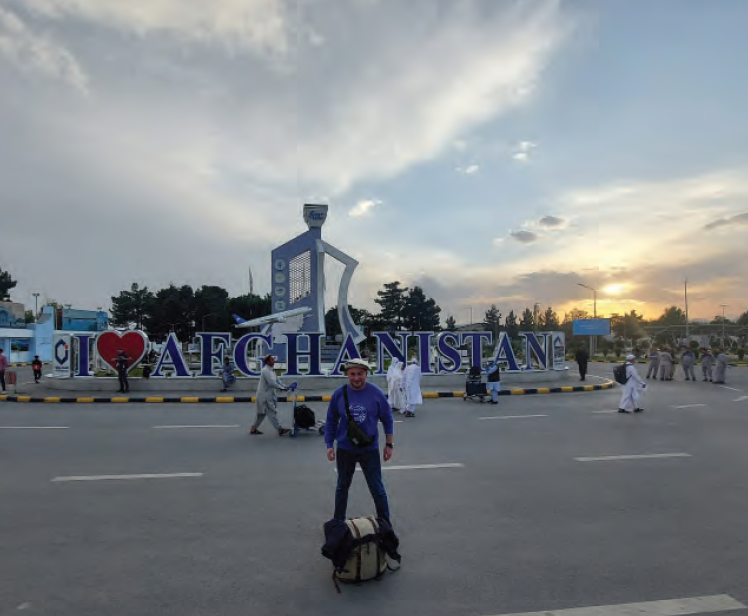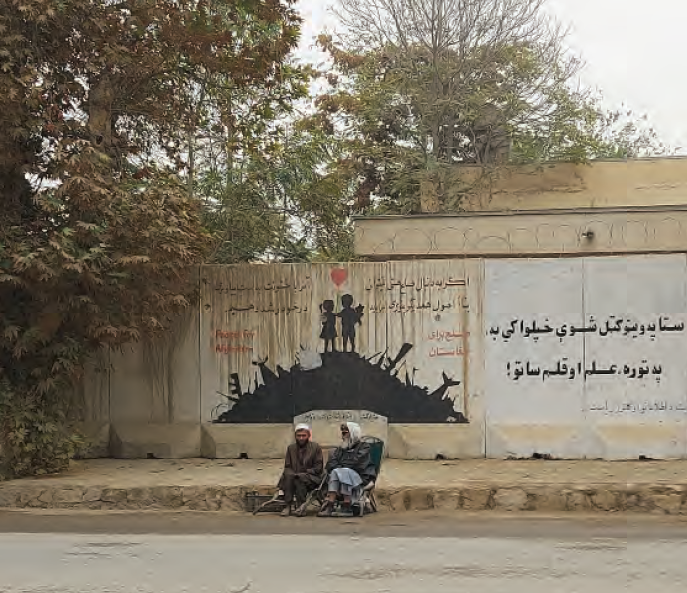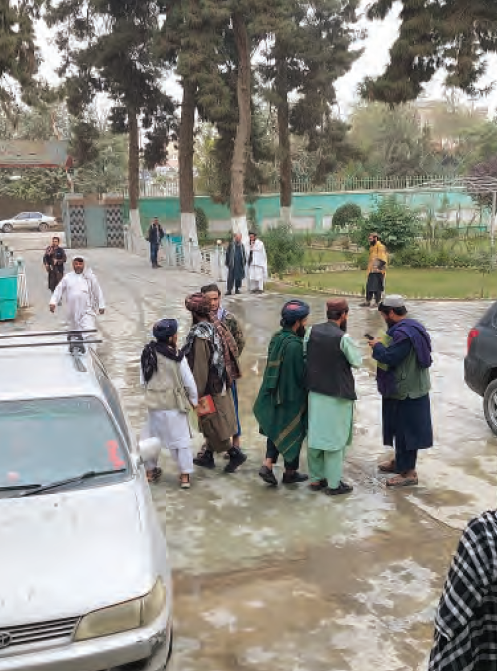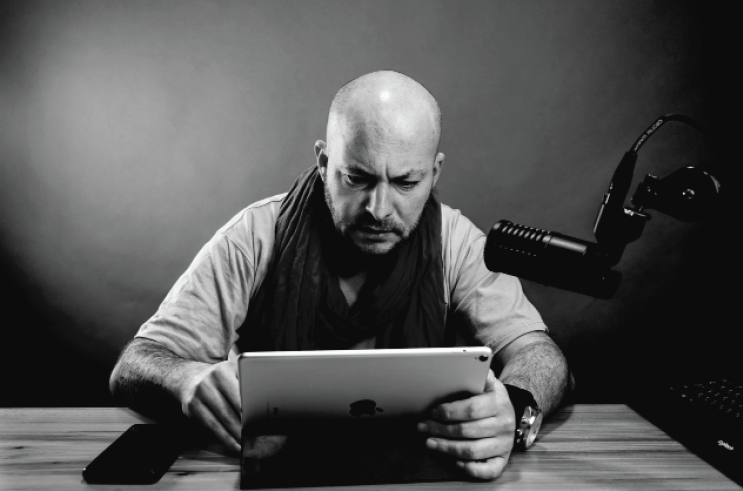The Long Road to Afghanistan
Published in: 34. In Worlds and TimesAbout the Author: Leonid Landa is a historian, orientalist, traveler, guide to the countries of the Middle East, and the author of the Telegram blog “From the Niger to the Indus.” In the past, he was a research fellow at the State Museum of the History of Religion in St. Petersburg and a history teacher. Currently, he is an author of lecture courses dedicated to the culture and ethnography of the Middle East, as well as a guide and a participant in various research projects.
First Attempt
Everyone dreams of visiting Afghanistan, even those who may not realize it. Why? Well, first and foremost, because “beyond the River,” as people used to say, it’s not just another country — it’s a different world, a different era. It resembles the kind of territory found in the adventure novels of Karl May, richly infused with the backdrop of the “Great Game.” However, that’s poetic license, albeit one quite close to reality. I remember in the distant 1980s, while in kindergarten in Leningrad, we played a game where we had to name a word starting with the letter “i.” The other children came up with various interesting words, like “needle” (igla) or “fig” (inzhir). Only five-year-old me confidently said, “Iran.” Why not? It’s a cool word, too. Maybe it was an attempt to take a side in the ongoing Iran-Iraq War, but in reality, I was just inching closer to the border with Afghanistan.
As an adult, every time I found myself near Afghan borders, I literally counted the kilometers. For instance, at eighteen, I visited the blessed city of Samarkand for a student research seminar — quite an interesting phenomenon, by the way. But the city overshadowed even the seminar. Samarkand is so grand that it cannot be exaggerated. It is one of the most iconic cities of our civilization, the center of ancient Sogdiana, the city of Omar Khayyam, the capital of the Timur Empire, the place where “all roads meet,” and much more. But for me, a crucial question was logistics. Just like Joseph Brodsky during his visit to Central Asia — he thought everything was clear with Samarkand, but how far is it to Afghanistan? Tajiks, Uzbeks, and even the legendary Lyuli told me it wasn’t very far, but still, it was distant — about 400 kilometers, give or take. And the border was closed since it was 2001. Incidentally, that was the last year of the Taliban in their first iteration. Back then, the doors to country A were tightly shut indeed. But, as they say, soon the “student” regime would fall, and the country would open up to travelers. I first entered Afghanistan not when the Taliban regime fell, though, but much later — in 2015. Here’s how that (didn’t) happen.
By the mid-2010s, the visa policy of the Afghan authorities had deteriorated, making it much harder to visit Afghanistan. In theory, one could obtain a visa, but in practice, it was extremely difficult. The only place rumored to issue Afghan visas easily was the distant high-altitude city of Khorog, located on the Pamir Highway in Tajikistan. They had a special, welcoming consulate there.
Thus, to enter Afghanistan, one first had to travel to Khorog for a visa. The challenge was that the road from the Tajik capital, Dushanbe, to Khorog is high-altitude and takes 16-20 hours. In our visa-oriented case, this journey would have to be made twice — there and back — and then we would still need to travel from Dushanbe to the Afghan border at Lower Panj. However, there was another plan. In theory, one could cross the border into Afghanistan without returning to Dushanbe, at the point where the visa is obtained, which is in Khorog on the Pamir. Fortunately, there is a mountain crossing there. Once on the other side, one could navigate through the mountains to Kabul.
This was the route that Timofey (a.k.a. The Contractor) and I decided to take. But let’s go step by step. The journey to Afghanistan began in Dushanbe. Here, in the capital of Tajikistan, we needed to find someone who could help us with the pass to the Pamir and connect us with someone in Khorog — someone who could handle Afghan-related matters. I must say, such a person was found quite quickly in a teahouse near the “Vakhsh” hotel. It turned out there was even a special office in Dushanbe for those wishing to take a well-deserved vacation in the mountains of Afghanistan. Interestingly, this office consisted of just one person named Ruslan. Ruslan resembled a blend of Khoja Nasreddin, a rock star from the 1980s, and a French artist from the times of Fernand Léger. This didn’t hinder, and perhaps even helped, him to be extremely efficient. We received our pass to visit Khorog (and other sections of the Pamir Highway) the very next day. A day later, we set off. To ensure everything went smoothly at the consulate, Ruslan provided us with the contact information of a certain Gulnara in Khorog, who could quickly resolve any issue. Specifically, for $120 per person, Gulnara would not only secure our visas but also provide essential information on how to see Afghanistan and, for example, not die. This information was crucial for us since after crossing the border, we needed to find a way to get to Kabul.
However, we already had a certain plan in mind — the plan of the century. We would calmly cross the Panj River, change into local clothing in the nearest Afghan village, and under the guise of being mute, take a local minibus to the district center of Faizabad, and from there, somehow make our way to Kabul. A brilliant plan! What could possibly go wrong?
For example, everything.
After leaving Dushanbe at 5:00 AM, we arrived in Khorog only by midnight. The road was both picturesque and interesting. The Pamiri driver told us how he used to work in Pakistan… as if it were nothing. It’s not far, after all. Just through the Wakhan Corridor! About eighty kilometers at most. Or maybe a hundred. Dangerous, though. There were terrorists from ISIS, the Taliban, and other lesser-known groups all around. However, the driver was no coward. For instance, before going to Pakistan, he had a vodka business — in Afghanistan. But that was all in the past. Now he had his own construction business in Dushanbe, and he also occasionally drove a taxi. Along the way, we encountered a mudslide, and there were other noteworthy events, but that’s a story for another time, so let’s return to Afghanistan. Upon arrival, we checked into a hotel, and the next morning, of course, we called Gulnara. We introduced ourselves as Leonid and Timofey, sent by Ruslan. Gulnara was delighted, and we were too, so we immediately headed to the Afghan consulate. Ahmad’s acquaintance turned out to be a charming and very positive young woman.
“Decided to spend your vacation in Afghanistan? Good choice! Especially since it’s May — the perfect season! Just write a waiver, dictated by me. Nothing special. Just so you’re aware of the war in Afghanistan, and if you get killed, we at the consulate are not responsible. Great!” she smiled. “Now sign here. That’ll be $120 each, and have a good time! Ah, what can I say? I would love to go myself, but work is work…
By the way, the taxi is free. Consider it on the house.”
And indeed. Just a few minutes later, the free taxi was ready to take us from Khorog to the border. I distinctly remember that the Niva’s speakers were blaring the most inappropriate song, “Rosa.” “And she stabbed him with a sharpened dagger in the chest for peace…” sang Mikhail Krug, while the mountains of Afghanistan unfolded in the distance.
It’s hard to think of a more mismatched playlist for such a backdrop.
The border between Tajikistan and Afghanistan looked like a portal to another world, adorned in khaki. Before letting us leave their country, the Tajiks tried to persuade us to reconsider: “What will you do there? There’s nothing! Just mountains! Nothing — just mountains and ISIS. Although they are franchised. But does that make it any easier for you? If you’re after those Masoud hats, you don’t need to go ‘beyond the river.’ Want us to give you some? Well, it’s up to you. Our job is to warn you,” said the wise Tajik border guards resignedly. On the Afghan side, no one was trying to dissuade us from crossing. They grunted “Shuravi,” were surprised, stamped our passports, and gestured toward the exit. But with a few words, even in “tarzandzhe” (the special language I used in Eastern countries), we managed to exchange pleasantries. It turned out that this border post was under the authority of the government in Kabul, but no one else in the area was subordinate to that government, so the border guards hadn’t left their post for about a month. At most, they had gone to a neighboring village…
Great! — we thought. That means there’s a neighboring village, and it’s relatively safe. So that’s where we need to go. However, getting to Bar-Panj (the nearest settlement) turned out to be not so simple. We were used to the idea that there should be some taxi drivers at the border. But this was clearly not the case. There were no taxi drivers or even minibuses at the Khorog crossing. Only a caravan of camels slowly and melancholically passed by, attending to their own affairs. But we couldn’t stop the camels?! Moreover, the caravan leader looked rather grim, armed with a Kalashnikov and a dagger, and didn’t inspire much trust…
When we were almost losing hope of leaving the border post and considering returning to Tajikistan, a glimmer of hope appeared on the horizon in the form of a vehicle heading directly to the border post. The car’s lucky owner also turned out to be fluent in Russian. He had learned a few words during his service in the ranks of the Afghan government army (DRA) (those were the guys who supported the presence of Soviet troops in the country during the 1980s). What he did for a living was unclear, but he was familiar with the situation and immediately informed us that it was calm in Bar-Panj, but ISIS members were roaming around. We asked for clarification: “Franchised ones?”
“Of course,” replied our new acquaintance. “And many of them speak Russian. But believe me, that won’t save you. And if you plan to cross these mountains to Kabul, you’d better hurry. Because the weather is turning.” We made an agreement with our companion Said (that was the driver’s name) that for a small sum in US dollars, he would take us to the village market, where we would buy local clothing and then, under the guise of being mute, find transportation on our own. Said even wrote us a sign in Farsi saying something like “Help, we need to get to Faizabad…”
At first, everything went according to plan. Aside from the annoying teenagers with stickers of Walt Disney’s iconic characters stuck on their rifles, nothing seemed amiss. But as often happens in Afghanistan, everything began suddenly. At some invisible signal, the merchants rushed to close their shops. The number of armed men seemed to increase, and their faces turned anxious. When the sounds of gunfire rang out from nowhere, our friend Said appeared. “Daula! Daula (ISIS)! Hurry!” he shouted, pointing to his car. We didn’t need much convincing. Just like that, without having had a proper stroll through the village, we were racing back to the border. In St. Petersburg, such trips are said to be “used to get a visa.” But here, the climate was different, not Finland, and the Tajiks on the other side greeted us like people returning from the dead.
“We told you! ISIS! We’re already preparing to receive refugees! And you wanted to go to Kabul! As mutes! Great plan!” The rest was unprintable.
The fighting around Bar-Panj lasted several days. The bandits never managed to seize the village completely.
In the end, the local Ismaili militia managed to push the terrorists back, so to speak, to the hundred and first kilometer. Thus, my first expedition to Afghanistan ended in a rather unremarkable manner. Yet it left a lasting impression on me. For several years afterward, whenever I crossed any border, I was asked, “Tell me, what were you doing in Afghanistan?”
“I was on a tour,” I would say.
“For one day?”
“Well, yes. You see, it was sort of a sightseeing tour.”

Second Visit
Despite the unsuccessful previous experience, I held onto the hope of truly visiting Afghanistan — to see Kabul and not die. The problem again lay with the visa. Obtaining it seemed impossible. Even Khorog had stopped issuing them. The situation began to change only after the Taliban returned to power in 2021. The Taliban 2.0, or the second iteration, were eager to show the world that they had become kinder. For this reason or another, starting in 2023, the Afghan embassy in Moscow began issuing visas to everyone who wanted one. So much so that one of my friends even considered applying for a visa with a passport that had an Israeli repatriate visa. In October 2023, our initiative group of six people finally set out for Afghanistan. Since the visa was obtained in Moscow, there was no point in going to Khorog, and it was decided to enter through the Lower Panj border crossing, which is (un)comfortably located in the lowland of Tajikistan, not far from the former Kaganovichabad. By the way, there’s another interesting story connected with that former Kaganovichabad. But let’s return to Afghanistan.
The border at Lower Panj was much livelier than that border post in the Pamir mountains. But Afghanistan was palpable even before reaching the official Taliban customs. Already on the bridge over the Panj, locals in national costumes were sitting, and the atmosphere changed radically after passing the Tajik customs. Interestingly, the Tajiks were again surprised by our tourist desire to visit Afghanistan. They found it completely incomprehensible why we would want to do that, especially at our own expense; it would be one thing if it were for work…
“We have mountains too, if you haven’t noticed, and those hats are for sale here, too…”

The Taliban border guards greeted us quite amiably — or rather, they didn’t react at all. At passport control, they asked where we were from, our names, and then wrote something down by ear. But that’s not entirely accurate. I have a theory that they didn’t write anything down but just pretended to jot something in a notebook. In any case, the expected entry stamp was obtained, and we fully set foot on Afghan soil. The first Afghan settlement located on the southern bank of the Panj, right by the customs, is called Sherkhan Bandar, and it is interesting for approximately no reason. Abandoned buildings along the riverbank, solitary (and not so solitary) Afghans in national clothing, with and without guns. Overall, it’s a rather dreary lowland place, where nothing reminded us of the river cargo port and oil depot built by Nikita Sergeyevich Khrushchev. There was no sign of Americans either. The boarded-up houses and shops were reminders of the recent exodus of anti-Taliban Afghans. Our immediate minimum plan was to reach Kunduz, the nearest large settlement with hotels and a special Taliban registration office. The latter was important. We wanted everything to be legal.
Unlike my previous experience interacting with the Afghan border, here in Sherkhan Bandar, there were taxi drivers, and our transport to Kunduz was arranged fairly quickly.
The driver of the car I was in spoke about unemployment and his desire to emigrate. Somewhere. For example, to Russia, the USA, or Abu Dhabi. Or India. When we passed Taliban checkpoints, he deliberately and loudly played Turkish music. The Taliban didn’t react to the music, though, and by evening, we arrived safely in Kunduz. What can I say about this city? Gloomy. Moreover, sand and mud storms were frequent. The consequences of these storms were evident everywhere, even in the trees. Overall, I didn’t like it there. Although the hotel, contrary to expectations, turned out to be quite decent, with a bathroom and relatively hot water. The food in the teahouse was also quite edible. Furthermore, concerns about the aggressiveness of Afghans in general and the Taliban in particular were unfounded. For instance, our hotel was hosting a conference on “new computer technologies and software protection.” This event looked quite exotic. The Taliban were dressed in national attire, turbans, with guns and… purple folders, apparently containing conference materials. Despite their intimidating appearance and the constant presence of firearms, the guys turned out to be quite cheerful and curious characters. We even met a local official who believed that “Shuravi” (“Soviets”) should take a more active role in Afghanistan’s economic life and suggested we create a couple of projects for Russian-Afghan business to circumvent some international sanctions.
The first night on Afghan soil also passed quietly, except that my basement room was filled with sand from a storm. But maybe that’s how it was meant to be. In the morning, after drinking tea, we boarded an Afghan version of a tuk-tuk and headed to the Taliban’s foreign department to obtain a special permit — an internal authorization for travel within the country and region. While the main part of our group settled in the guest area of this ministry and watched videos about fighting Jews, I went to negotiate with the chief Taliban officer. In the official’s office, there were no chairs or tables; the arbiter of our touristic fate sat on a carpet, with a Kalashnikov leaning against the wall. The Taliban offered me tea and sweets but did not issue a permit. He said, “Just go as you are. Everything’s fine.” To reinforce his decision, he asked one of the fighters to translate via Google that “our problem is solved.” That’s just what his smartphone told us in Russian: “Your problem is solved.” The problem was that we didn’t really have a problem…
As I mentioned, Kunduz is a gloomy place, and I was eager to leave for something more civilized. For instance, to Mazar-i-Sharif. After all, it’s the fourth-largest city in the country, the former capital of General Dostum, once the stronghold of the Northern Alliance, and now the largest center in Balkh province under Taliban control. So we decided that since we had no problems now, it was time to part ways with Kunduz.

The road to Mazar-i-Sharif isn’t particularly picturesque and passes through a desert inhabited by semi-nomadic tribes living in simple adobe houses, reminiscent of the set from the film “9th Company.” The young nomads are known to throw stones at passing cars, but overall, it’s relatively safe there. Mazar-i-Sharif greeted us with good weather and appeared to be a center of civilization compared to Kunduz. The main attraction of the city is the Blue Mosque — one of the presumed burial sites of the fourth righteous caliph, Ali, the son-in-law, cousin, and companion of the Prophet Muhammad. Nearby is a colorful bazaar. We, too, seemed to stand out, and our presence everywhere sparked heightened interest and a desire for photos. Wow! “Shuravi” had arrived! The owner of the teahouse in the bazaar turned out to be an Afghan who had lived for many years in Minsk and Polotsk, and he had neither a turban nor a beard. In the same establishment, there was a Chinese woman who refused to have dinner behind the curtain, as well as a group of young Taliban. In the city itself, there were quite a few people who spoke English (or Russian). There was also a plethora of goods from Russia and Central Asian countries. In the local ministry that issued permits, there were also people who knew languages. And here, unlike in Kunduz, we managed to obtain a permit to travel in the region. The permit resembled a sort of collective ticket to a museum in the neighboring city of Balkh — but it bore the Taliban stamp. To jump ahead, I’ll say that we used this “museum ticket” not only in Balkh province but all over the country. Interestingly, the Taliban accepted our “ticket” with no issues, allowing us to pass at all checkpoints — even in Kabul. I have a theory that this was connected with the spread of literacy among the Taliban, or rather, its absence. Seeing Taliban’s respect for this document, I came up with the idea that it said something like: “Attention, attention! To all posts, mujahideen and field commanders! The bearer of this ticket to the museum is a friend!” After spending a couple of interesting days in the city and even visiting the courtyard of the famous mosque, and buying plane tickets to Kabul, we went to the airport of Mazar-i-Sharif. I remember the airport because of a woman with an open face. What made the situation even more colorful was that this woman energetically walked toward me. Naturally, I was scared. Was this a joke? A woman with an open face wants something from a man — in Afghanistan! That shouldn’t happen! Yet the reality turned out to be different from the information broadcast by the media. It turned out that this woman with an open face, say, worked at the airport, and in this case didn’t understand why I was running away from her while she was simply showing me where to put my luggage for inspection… Such are the difficulties of translation. But let’s be honest, I only encountered such instances at airports. But there were quite a few women with open faces on the streets of Kabul and at the bazaar in Mazar-i-Sharif. By the way, in Kabul we even once observed several women with open faces in a coffee shop… at the next table! In general, things happen in different ways. Let’s go back to the airport in Mazar-i-Sharif. After checking my backpack, I expectedly found myself in the smoking room of the departure area. Where another interesting dialogue took place. So, an Afghan in national clothes comes up to me. By the looks of him — a Hazara. That’s a local Shiite people of mixed Mongol-Turkic-Iranian origin. Something about this guy was unsettling, though. Maybe that the presumed Hazara proposed that I share a cigarette with him in the language of Ilyich and without any accent.
“How do you know Russian so well,” I say. “Did you serve in the DRA (pro-Soviet Democratic Republic of Afghanistan) army?”
“What DRA army? What’s wrong with you? I’m a Kazakh from Chimkent. I’m bringing food to the Taliban. And don’t pay attention to the Afghan clothes. It’s for ease of communication. So what, aren’t you rich in cigarettes?”
“I’m rich,” I say. “Why shouldn’t I be rich, especially for a fellow countryman…”
The Afghan airline “Ariana” is quite respectable and even has an unexpected and not very expensive business class. The flight to the capital of Afghanistan takes about an hour. And so, barely having time to take off, we are already heading to the center of Kabul, looking for, so to speak, our special hotel for foreigners. To get ahead of myself, I’ll say that we only spent one night in the special hotel, and not because it was expensive or because we were greedy, but because there were very strict security rules, which attracted the maximum attention of international thugs and space pirate types.
In a regular hotel with one security guard, it seemed like there was more security than in a tourist hotel, which resembled a besieged citadel with all the rules of a Ben Gurion Airport.
Afghanistan, like other similar countries, such as Iraq (and even Mauritania), is interesting not only for its sights and the colorful reality of local life, but also for the compatriots one meets there, who are in all these Baghdads and Kabuls for various purposes. “Russians?” we were asked by just that kind of obvious compatriot in an Afghan national costume. “My name is Nikolai Ivanovich. For what purpose are you here? Who do you work with? Do the embassies know? What?! Did you come for an excursion?? A sightseeing tour?? What excursion in Afghanistan? And what do you mean “quietly”? Do you want to go around Kabul, here and there? And those hats. Have you noticed that Ahmad Shah Massoud is not the most popular figure among the “toliks” and that the Masoud hats have kind of gone out of fashion? Oh well.”
“And you yourself, Nikolai Ivanovich, have you been in Afghanistan for a long time?” we ask.
“A long time. The first time was in 1983. But there was a war then. And now we’re making a film. An ethnographic one. With Grisha.”
“So, you were an eyewitness to many events? Very interesting! Do you have any free time? We’re staying at a hotel…”
“I know which hotel you’re staying at. All of Kabul knows. Quietly, they… Okay. I’ll stop by tomorrow. Say hello to the hotel owner from Nikolai. He knows.”
The next day, Nikolai Ivanovich showed up at the rooftop restaurant, and with him was the director, Grigory, dressed in an Afghan suit. Despite his authentic regional clothing, Grigory most resembled the chief rabbi of the Mogilev region… well, or Moscow. The third in this group was an Afghan named Ahmed, unexpectedly dressed in a European style.
What exactly Nikolai Ivanovich’s group was doing in Afghanistan remains a mystery to me. But definitely, a lot of things. At parting, having learned about our plans to visit the mountain villages of Panjshir and Nangarhar, Nikolai Ivanovich sullenly reported that, firstly, in the Panjshir Gorge above the Masud mausoleum, it was cloudy, and there were no Taliban authority, but there were partisans, say; secondly (and this more concerned the province of Nangarhar), remember, comrades: “Afghanistan is a wonderland; you go into a village and disappear there.” Kabul is a city of contrasts; that can be said about anywhere, though. Penza, for example, is also a city of contrasts. Helsinki is a city of contrasts. Anywhere is a city of contrasts. But Kabul is truly a special place. To feel the capital of Afghanistan, you have to live here. But even in a few days, walking through the bazaar and the Soviet “microdistrict,” climbing to the observation deck and visiting the suburbs, you can feel the city’s rhythm. Even the famous and mostly touristy Chicken Street conveys a certain mood of the era and time.
But everything ends someday. Our Afghan journey ended too. And so, a week later we were again on the same bridge from Afghan Sherkhan Bandar going to Tajikistan’s Lower Pyanj. Interestingly, one of the most joyful moments of the trip to Afghanistan was the moment of leaving the country. On the northern bank of the Pyanj, taxi drivers were already waiting for us. “Hello, brother! Are you coming from Afghanistan? Are you going straight to Dushanbe or first to the store?”
“Straight to the store,” I answered.
And so ended my second visit to country A. And I hope it’s not my last. Because, despite the joy of leaving country A, I want to go back there very soon.



Speak Your Mind